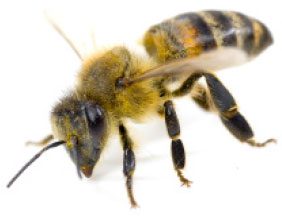 One Sunday morning, in the warmth of spring, our regular church service was well underway. There was a call to worship, singing and Scripture reading. About halfway through the guest preacher’s sermon, some of us noticed a few uninvited guests in the upstairs balcony – a dozen or so bees buzzing around the window sill.
One Sunday morning, in the warmth of spring, our regular church service was well underway. There was a call to worship, singing and Scripture reading. About halfway through the guest preacher’s sermon, some of us noticed a few uninvited guests in the upstairs balcony – a dozen or so bees buzzing around the window sill.
“Don’t worry,” I whispered to my wife and co-pastor Tabitha. “There aren’t many people up there. If no one bothers the bees, they won’t bother us.”
“If you say so,” she said.
But as a few moments passed, the number of bees grew. Soon, there were dozens of bees buzzing around the rafters and light fixtures. The steady drone intensified, competing for the attention of worshippers, as some began to gaze upward.
The preacher continued unfazed, while the number of bees climbed into the hundreds. At that point, it became prudent to interrupt the sermon and instruct the congregation to evacuate the auditorium. Hastening to the platform, I apologized to our guest speaker, swatted a bee off his head and made a brief yet urgent announcement.
“Attention, everyone, don’t be alarmed. But due to the number of bees in the sanctuary, we will be moving downstairs into the gymnasium where we will continue this morning’s worship service,” I said.
As everyone calmly filed out of the auditorium, thousands of bees poured in. They were passing through a small crack in the wall just above the baptistry. Safely assembled downstairs, our service resumed. The speaker concluded his sermon, we sang a song or two and we dismissed with a benediction.
Meanwhile, upstairs, the swarm of bees left of their own accord, presumably the way they came in. They gathered outside on one of the evergreen trees in a massive huddle, making it easy for a local beekeeper to pick them up that same afternoon.
Worlds colliding
At first glance, it may seem the bee incident was a case of disparate worlds colliding. There we were, seekers gathered inside for worship, minds set upon spiritual things. Souls longed for a transcendent encounter with God, putting aside the problems and cares of everyday life.
But then a terrible interruption – a dark cloud of boorish, stinging pests flooded into our worship space, forcing us to flee for safety. Could anything be more contrary to a worship experience than such a wild invasion?
It all depends on how we understand the call to worship.
In Psalm 96, the initial summons to “sing to the Lord” echoes God’s eternal invitation to life-giving worship. God’s salvation, glory and marvelous deeds motivate praise and proclamation. The psalm’s focal point is the reign of God, the joyful anticipation that God is coming to make all things right: “for he comes, he comes to judge the earth. He will judge the world in righteousness and the peoples in his faithfulness ” (v. 13). Thus, the psalmist invites all the earth to celebrate this good news with rejoicing and praise.
Even today, faithful worship responds to such a call. Attention is directed to the good news of God’s work – past, present and future. All are summoned to rejoice in a God who comes to make all things right, and worship replies to that call.
The call goes out
But Psalm 96 also reminds us that the scope of worship isn’t as limited as we might expect. Worship isn’t restricted to the inward hearts of individuals; it isn’t merely for souls longing for an encounter with God. The call to worship extends to entire peoples and “families of nations” (v. 7).
Indeed, the call goes beyond people altogether and out to all creation: trees of the forest, the sea and all that is in it, fields and everything in them (v. 11–12). It includes soil and rock, fish and fowl, reptiles and rodents, and yes – even bees.
God’s saving work is for all creation, and all creation is invited to respond in worship. Therefore, while swarming bees are obviously misplaced in the context of a safe and civilized gathering, they aren’t out of place in the broader context of worship.
This notion can be difficult in a time when worship is broadly understood as primarily inward and affective. For many, worship rises above external, mundane affairs and transcends limits of place and time. Darkened windows, professionally lit platforms, and theatre-style seating curb distractions from the outside world to foster awe and inspiration. Accordingly, worshippers temporarily forget their fragile and vulnerable place within creation in a quest to experience the eternal God.
Yet here, the psalmist calls us to worship God, not in spite of our creaturely condition, but by virtue of it. The call isn’t to escape creation in pursuit of a distant God, fleeing the mundane and ordinary, but to rejoice in a God who reigns over creation and comes to redeem it – bee stings, bruises, and all.
—Michael VandenEnden is pastor of Grantham MB Church, St. Catharines, Ont.